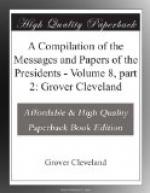It has been agreed upon, and is presented to the consideration of the Senate as a substitute for the treaty signed at the Indian Springs on the 12th of February last. The circumstances under which this received on the 3d of March last your advice and consent to its ratification are known to you. It was transmitted to me from the Senate on the 5th of March, and ratified in full confidence yielded to the advice and consent of the Senate, under a firm belief, founded on the journal of the commissioners of the United States and on the express statements in the letter of one of them of the 16th of February to the then Secretary of War, that it had been concluded with a large majority of the chiefs of the Creek Nation and with a reasonable prospect of immediate acquiescence by the remainder.
This expectation has not merely been disappointed. The first measures for carrying the treaty into execution had scarcely been taken when the two principal chiefs who had signed it fell victims to the exasperation of the great mass of the nation, and their families and dependents, far from being able to execute the engagements on their part, fled for life, safety, and subsistence from the territories which they had assumed to cede, to our own. Yet, in this fugitive condition, and while subsisting on the bounty of the United States, they have been found advancing pretensions to receive exclusively to themselves the whole of the sums stipulated by the commissioners of the United States in payment for all the lands of the Creek Nation which were ceded by the terms of the treaty. And they have claimed the stipulation of the eighth article, that the United States would “protect the emigrating party against the encroachments, hostilities, and impositions of the whites and of all others,” as an engagement by which the United States were bound to become the instruments of their vengeance and to inflict upon the majority of the Creek Nation the punishment of Indian retribution to gratify the vindictive fury of an impotent and helpless minority of their own tribe.
In this state of things the question is not whether the treaty of the 12th of February last shall or shall not be executed. So far as the United States were or could be bound by it I have been anxiously desirous of carrying it into execution. But, like other treaties, its fulfillment depends upon the will not of one but of both the parties to it. The parties on the face of the treaty are the United States and the Creek Nation, and however desirous one of them may be to give it effect, this wish must prove abortive while the other party refuses to perform its stipulations and disavows its obligations. By the refusal of the Creek Nation to perform their part of the treaty the United States are absolved from all its engagements on their part, and the alternative left them is either to resort to measures of war to secure by force the advantages stipulated to them in the treaty or to attempt the adjustment of the




